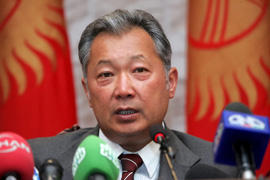Voting under way in Kyrgyzstan
Snap parliamentary elections unlikely to end political turmoil in the country.

The vote was necessitated by constitutional changes approved in October that were supposed to ease relations between Bakiyev and his detractors in parliament by increasing the powers of the legislature.
More than 250 observers from the OSCE’s election monitoring arm will be watching the vote across the nation of five million.
Potential unrest in Kyrgyzstan is a worry to Russia and the West as it might spill over into other Central Asian regions.
Bakiyev says a less unruly parliament would help the government press ahead with stalled economic reforms in an impoverished country burdened by a huge external debt.
History of protest
But the opposition said it feared Bakiyev might overstep the mark and block their entry into the assembly altogether.
 |
| Bakiyev’s two-year tenure as president has been marked by political unrest [EPA] |
Since assuming the presidency two years ago, Bakiyev has struggled with politicians over government appointments and the scope of presidential powers.
Opposition supporters have frequently massed in the centre of the capital, Bishkek.
Police cracked down in April, using tear gas and stun grenades to break up protests.
Opposition groups have said they will respond to any election fraud by taking to the streets again.
Alleged fraud during the 2005 parliamentary vote led to mass protests that drove former president Akayev from power.
A new wave of protests could hit Kyrgyzstan hard. Unlike its energy-rich neighbours, the largely agricultural nation of has limited resources and is one of the region’s poorest countries.